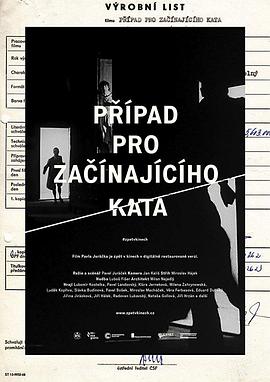为年轻刽子手的辩护
主演:卢博米尔·科斯特尔卡 克拉拉·耶尔内科娃 米列娜·扎赫里诺夫斯卡 拉多万·卢卡夫斯基 伊日·扬达 卢德克·科普日瓦 米洛什·瓦夫拉 米罗斯拉夫·马哈切克
导演:帕维尔·祖拉契克
详细剧情
长篇影评
1 ) 你累了,休息吧!
开头坠入梦境那段看了好多遍,真是太棒了。死刑那里也很棒,表演式的死刑。
当公主说想一起去地上生活的时候,男主问你知道淋病吗,公主听不懂,很茫然,男主说我得过三次,然后男主就直接走了,这里让我笑出声。是的,公主根本适应不了地上的生活,对地上不过是出于无知的憧憬,也并不会真的去地上。
这里的秩序维持者和企图变革者都是一样的扭曲,殊途同归,那些变革者发现男主说出的真相并不是他们所想要听到的“真相”的时候,他们的第一反应就是否定,想要毁灭男主。
最后离开这疯狂压抑变态扭曲粘滞让人恶心的一团糟的烂泥一样的地方,躺在乡间路上摇摇晃晃的木板车上,宛如大梦醒来,可这让人怎么分清现实和梦境,摆脱了,但是真的摆脱了吗,难道梦境就不会成为现实吗,或者说,梦境难道不是正在发生的另一种现实吗,坠入彼处的陷阱难道不是随时都可能再次出现的吗,这让人怎么能够不在意呢,可这一切又让人怎么能够理清呢,但总算是喘了口气,呼吸,这空气多舒爽,呼吸,别去想了,至少你现在逃脱了。你累了,休息吧!
2 ) 乌托邦的殒落
《为年轻刽子手的辩护》叙述无疑是荒诞的,说超现实、魔幻之类也可。面对这样小故事叙述清晰,但却让人坠入云雾中的电影,我们就需要找到一把开启法门的钥匙。这把钥匙并不难找,卡夫卡,更进一步说,他的《城堡》。看过卡夫卡的城堡之后,我觉得这个电影就好理解很多。另外,我们可以再找点钥匙,叙述圈套可以参考下博尔赫斯,而政治讽刺是《格列佛游记》的特色,更广泛一些,是那些经典的乌托邦与反乌托邦系列。另外,添加点心理学的作料,这道菜就更好了。
剩下的事就相当容易了,一些细节就不难堪破。
格列佛从一条路进入了一个世界,这还是一条被迫的路。这条路无疑通往一个梦境,梦境是超现实的,超理性的,它可以跳跃荒诞。但梦并不是无逻辑无原因的,它和记忆和思想有关。
他随着车向下盘旋,撞死了一只兔子,并取得了一块怀表,这块表是拉普达王子的。这就是他的一个契机,一个身份。(和《城堡》里土地测量员的身份类似。)
接着他在梦境中返回到了自己少年时代的屋子,在这里,我认为这代表着对少年时代纯真的向往和缅怀。相比成人世界,少年时代无疑是纯洁的本源的,不虚伪不被侵蚀的。并且清晰地出现了一个名字,他记忆中的少年恋人。在后来的巴国中和拉普达中,他都遇见了这个相似的姑娘,天真浪漫而纯洁。
回到过去,他发现自己并不受欢迎,各色人等对他拳打脚踢,这个梦彻底成为荒诞的。但更重要的是,无原因的暴力。对一个个体来说,庞大的陌生的无形的压迫。联想更多点,我们可以想起余华的《十八岁出门远行》。
他拼命逃走,但四处几乎是一样的。他作为一个外来者,本能地受到排斥,对于挑战秩序或者庞然大物的人,总是受到本能的怀疑。幸运的是,他有一块表,这种莫名的身份象征使他能够得到一个良好的待遇,但他首先必须承认自己是兔子奥斯卡。他在巴……国中乱转。让我们来看看这个国家:星期一集体沉默,不能说一句话,没人明白为什么。作为知识分子的教授和诗人,对此毫无反抗,虽然他们似乎能帮助格列佛一些什么。拉普达笼罩在他们上空时,他们的城市变得黑暗无比,只有声音。总督无所事事,每天玩核桃。拉普达作为一个神秘的国度,与巴国并无联系,却以一种莫名的方式影响着巴国。
格列佛受到拉普达王子的邀请,通过通天巨塔登上了拉普达。然而拉普达并非想象的那么神秘,大臣,王子亲王们过着无聊的生活,他们对下面的世界同样陌生,并且毫无联系。国王在卡尔登酒店当了十年门房。还有什么,这个至高无上的权力中心,说白了什么也没有,就是纸老虎。当格列佛走出拉普达的时候,他们恳请他不要道破。然而格列佛却在巴国说出来一切,他本来是为了拯救巴国的人,然而却受到总督的追杀,更多的人对他产生了敌意,他无奈之中,离开了巴国。唯一的清醒的是一个傻瓜——这是惯用伎俩,小丑、傻瓜往往是最能堪破世情的,这个傻瓜带着他返回来最初的路,手表的时间向后跑,他的时间并没有改变,这不过是一个梦。
更重要的象征寓意,就在于卡夫卡的小说里。权力机关,在卡夫卡的小说里,城堡或者诉讼室里的档案总是有厚厚的灰尘,机关办事人员随性而为,效率几乎为零,他们的命令随意发布又随意收回,他们对下面的情况模糊而且不值一提。但他们拥有权力,在下层与上层的对抗中,这种昏晕、模糊、低效消磨掉了下层人的对抗,甚至他们的生命。想想咱们平时办一个证,弄什么档案,跟权力机关打交道,都是这么回事。而电影里,拉普达对于巴国来说是陌生的,由于它漂浮在空中,受到了各国的礼遇,由于陌生,它获得了极大的神话权力。拉普达对巴国什么也没干涉过,但对于巴国的影响是巨大的,他们的沉默(话语权)他们自认为是拉普达命令的——作为下层人,总是甘愿地放弃一些权力来取悦上层。一个外国人,一个局外人,总是对权力的模糊和庞大感到不可思议,但他却真实地存在着,你以为你掌握真理就能解救他人是不可行的,最后的结局不免被吊在十字架上或火烧,或者逃走。人的愚昧、冷漠、习惯是可怕的,他自觉地沿袭守旧,他害怕一切新的改变,他拒绝改变,他甚至尽力去维持这种虚假的生活。
有时候我们想问理想国是怎样的,乌托邦是怎样的,其实从来没有这种理想的生活。在《乌托邦》里,莫尔甚至让一部分奴隶丧失了权力。在老子的大同社会力,其实就是所谓的愚民。反而在反乌托邦的系列中,我们看到任何社会的虚伪。《1984》《蝇王》《华氏451》以及卡夫卡的小说。
最后我还没太明白这个题目,试着来解释下吧。年轻刽子手是谁?格列佛,他杀死了一只兔子。为他辩护,理由就是整个巴国以及拉普达。在他们的麻木冷漠沉默中,他的罪无足轻重。
多啰嗦一句,不要太迷恋和惧怕超现实什么的。暂住证,高考户籍,高考,公务员,春运,还有那疯狂的造神年代,这一切组合起来在任何不了解现实人的眼里就是超超现实。
3 ) [Film Review] Case for a Rookie Hangman (1970) 8.0/10

A less extolled eminent figure of Czech New Wave, Pavel Jurácek (1935-1989), notably recognized as the scribe contributing to significant works like Vera Chytilová’s DAISIES (1966) and Jindřich Polák’s VOYAGE TO THE END OF THE UNIVERSE (1963), only bequeaths posterity with two feature films as the director, but it is hardly his fault, after CASE FOR A ROOKIE HANGMAN is banned by his country, which also truncates his movie career entirely.
This ill-fated one-hit-wonder is nominally an adaptation of Jonathan Swift’s GULLIVER’S TRAVELS, but by positing a suit-clad hare as the main agent to jump-start its idiosyncratic plot, it also reminisces of Lewis Carroll’s ALICE’S ADVENTURES IN WONDERLAND. Starting as a surreal trip down the memory lane after a bizarre car accident, Lemuel Gulliver (Kostelka) fetches up in the territory of Barnibarbi, a fictitious Mitteleuropean country practicing unorthodox social mores, among other things, every Monday is “silence day”, thence no one is allowed to talk on that day,
Gulliver enters his rabbit hole with utter befuddlement and resignation, having taken a pocket watch from the dead hare, he is mistaken by the people in Barnibarbi as Oscar, the prince of Laputa, which is a rarified realm floating aloft, where dwelling the venerated king of Barnibarbi, finally Gulliver is granted a visit to Laputa through a lofty tower, but it is far from the Ruritania one might imagine, the king has spirited away in Monte Carlo (as a bellhop no less) for more than a decade, upon his return terra firma, the truth stings, he is assaulted by governor of Barnibarbi (Hálek), and must find a way to flee this crazed land.
Foregrounding the story’s Kafkaesque machinations and non-sequitur peculiarities, Jurácek spectacularly eventuates a deceptively freewheeling journey through its memorable mise-en-scène (a nightmarish sequence with mobile floor boards), daringly swift editing choices (a vertical plunge to a door on the floor magically follows by a door opening horizontally to a study) and whimsical chiaroscuro deployment, not to mention Lubos Fiser’s brilliantly emotional incidental music, accompanying Gulliver’s increasingly exasperated fish-out-of-water existence among alienness, illogicality, reality-and-dream blurring displacement, his deceased childhood sweetheart Marketa (Jerneková) is reincarnated as a giggling princess, intermittently pops up and titillates him, yet every time, he wakes up with the same bedfellow in the person of a sultry Dominika (Zahrynowska).
Prima facie, Jurácek’s strangely enrapturing feature can be patly construed as an allegorical tool leveling at the autocratic government at then, with its symbolic innuendos and the depiction of a tinpot monarchy and a seeming utopia in the throe of high-handed surveillance and hypocrisy, but if we peel it off its ambiguous messages, what in the kernel is indeed, a fantastically configured fairytale totally devoid of the usual Hollywood triteness and affectation, archly cynical, beguilingly inexplicable, and capriciously surprising, Jurácek competently sinks his teeth into actualizing this lollapalooza, were it not for the deplorable suppression from the Establishment, he could have become a major player in the world cinema, alas, bless we still have CASE FOR A ROOKIE HANGMAN to quench the ire.
referential entries: Vera Chytilová’s DAISIES (1966, 7.6/10); Jaromil Jires’ VALERIE AND HER WEEK OF WONDERS (1970, 6.9/10).

4 ) 本片中一个有趣的发现
《为年轻刽子手的辩护》的导演帕维尔·祖拉契克还有一部片子叫《约瑟夫·基利安》,我是20年10月22日先看的《约瑟夫·基利安》然后21年1月11日后看的《为年轻刽子手的辩护》。
而看到本片后面的时候突然被其中一个人物所吸引,因为他的角色形象太深入人心,甚至是另一部影片《约瑟夫·基利安》的主角,那就是这位西装革履并手提装着一只猫的公文包的男人。



在《约瑟夫·基利安》中,这位男子一直在寻找一个叫基利安的人,并且在一家租猫的商店里租了一只猫,可是后来想要归还的时候却再也找不到这家商店,于是,他寻找基利安的过程中一直带着公文包和猫。同时,本片和猫这个元素有着非常丰富的关系,影片的内容天马行空,荒诞又有趣。
回到《为年轻刽子手的辩护》,是关于格利佛在遭遇一次车祸后醒来走进一个超现实世界而引发的一系列故事,故事情节在此不多叙述,但是影片中那个超现实世界里有一个只出现在几处短暂镜头里的人物。
他西装革履,抱着一个公文包,公文包里装着一只猫。


不知这是不是导演安排的一个小彩蛋,真的蛮有意思的,《约瑟夫·基利安》确实也拍摄更早于《为年轻刽子手的辩护》,不禁让人产生联想,既然这个男子最后出现在格利佛进入的“超现实世界”,那么他在《约瑟夫·基利安》中所处的世界是否本就是这个“超现实世界”呢?
又或者是一些其他的联想,这个带着装猫公文包的男子最后找到基利安了吗?是在这个寻找的过程中也进入了“超现实世界”,还是说他最后找到了基利安,发现自己已然身处于“另一个世界”?
总之,一个小彩蛋,可以有很多的想象。
今天回顾片单的时候看见自己去年写的观后感评论,所以把具体的图文都列了出来,希望有更多朋友观看到这两部有意思的影片。





















no one can make surreal film like juracek anymore...he's the biggest tragedy in czech cinema.:(
穿衣服的兔子就像爱丽丝梦游仙境那只。
社会主义时代的捷克电影,任何主题都可以政治化,这部刨除了奇幻元素的《格列佛游记》,剩下的只有讽刺。我不觉得那时的观众会喜欢这种压抑的影像和欲说还休的言语表达,因为它太沉重太隐晦,而且同期类似的风格,很容易让人产生审美疲劳
让我想起了Le procès
灵感来自《格列弗游记》第三卷,超现实主义寓言,到处是看不懂的讽刺暗指,犹如梦一场。场景切换有时是生硬切入,有种不连续的跳跃感。三次突然醒来,旁边是陌生的黑发女子同床共枕,不明白什么意思。进入奇怪国度的入口是撞到穿衣服的兔子,可能也融合了爱丽丝梦游仙境的部分设定。走出时发现捡到的怀表指针倒着走——“你干嘛总是无事生非,听着它滴滴答答还不够吗?”
片子在最后五分钟才有趣起来,前面所谓的超现实、反乌托邦情节在众多此类片中根本没有独特之处
很闷 给五星的 你们到底看懂了没有
K+K推荐。挺牛逼,但在敏感时期拍这样的片就是一种明晃晃的作死行为
捷克电影就是牛比
看前面觉得好跳线啊好喜欢啊脸都笑成花了。。。然后越往后看越面瘫
非常超现实非常魔幻,我爱关于梦境的一切。有关梦境,真让我联想起布努艾尔之审慎魅力
剪辑!
各种让人摸不着头脑的经历。
格列佛游记的超现实主义解读,棱角分明的捷克新浪潮电影,冷峻的东欧特色奇幻,冷战背景下总弥漫着巨大的政治焦虑以及人性的压抑。
8.0/10。其实光看高超的剪辑和极富创意的摄影就够了,配乐也很牛逼。这种意识流形态的超现实主义果然还是捷克人玩得最好,从片名就可知讽刺得有多么极端。很闷很难懂,给四星算违心,但还是感觉很牛逼。。。其实最牛逼的是导演敢为这片终止了自己的创作生涯。
“时钟倒走,我们的刽子手坠入歧途,撞屎了只穿着衣服的兔子。”我只是在用最真挚超现实肉身经验在作事实诡辩。
荒诞感让我想到布努埃尔的作品,而内容又让我觉得格列佛仿佛进入了卡夫卡的《城堡》里进行了一次《审判》。但捷克斯洛伐克这种带着政治隐喻的超现实主义片,一直都不是我的所爱。
格列佛漫游奇境记
费氏奥德赛+布努艾尔的荒诞讽刺...喜欢电影的开篇。导演用电影生涯获取的一部电影(没见过这么高豆瓣分的)。
闷得可以啊。